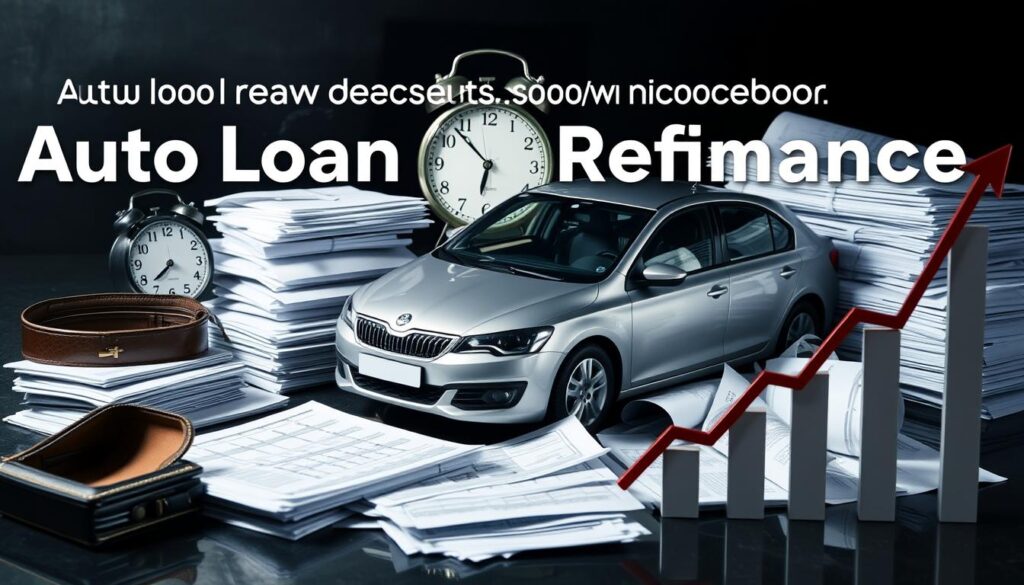Refinancing your auto loan might save you a lot of money over time. Getting a lower interest rate can cut your monthly payments and give you more financial freedom. But, refinancing isn’t right for everyone. It has its own pros and cons that need careful thought.
Think about the long-term savings, not just the monthly payment drop. When you refinance, look at the current interest rate, your credit score, the loan term left, and any fees. Knowing these details helps decide if refinancing is good for you.
Key Takeaways
- Auto loan refinancing can potentially save you money by securing a lower interest rate
- Evaluate the long-term savings, not just the monthly payment reduction
- Consider factors like credit score, loan term, and fees when deciding to refinance
- Refinancing may lead to paying more interest overall if the loan term is extended
- Upfront fees and costs associated with refinancing should be weighed against the potential savings
Understanding Auto Loan Refinancing
Auto loan refinancing means swapping your current car loan for a new one. This can help you get a better interest rate, lower monthly payments, or pay off your loan faster. But, it’s important to know the downsides too.
What is Auto Loan Refinancing?
Refinancing your auto loan means getting a new loan to replace the old one. People refinance for a few main reasons:
- Securing a lower interest rate
- Lowering their monthly payments
- Paying off the loan sooner
Why Refinance Your Auto Loan?
Refinancing can save you money in several ways. If your credit score has gone up, you might get a lower interest rate. This can save you a lot over time. Also, if interest rates have dropped, refinancing can help you get those lower rates and lower payments.
Recent data shows refinancing can lead to better interest rates and lower payments. It’s good if your credit score has improved, you’ve found a lender with lower rates, or if you have positive equity in your car. Lenders often offer better rates if your car is a year or more old.
Refinancing is a good idea if your credit score has improved or if your current rate is high. A refinance calculator can show you how much you could save. But, refinancing might not be the best choice if your car has high mileage or is old, you have prepayment penalties, or if you’re upside down on the loan.
Pros of Auto Loan Refinancing

Refinancing your auto loan can offer many benefits. One key advantage is getting a lower interest rate on your loan. If your credit score has gone up, you might qualify for a better rate. This can save you a lot of money over time.
Another benefit is the chance to lower your monthly payments. Getting a lower interest rate or extending your loan can help. This can make it easier to manage your money, especially if your financial situation has changed.
Paying Off Your Loan Sooner
Refinancing can also help you pay off your car loan faster. If you’re in a better financial spot, you might refinance to a shorter term. This means you’ll pay off the loan quicker and save on interest.
| Loan Amount | Original Interest Rate | Original Loan Term | Refinanced Interest Rate | Refinanced Loan Term | Total Interest Saved |
|---|---|---|---|---|---|
| $25,000 | 7% | 60 months | 5% | 48 months | $2,522 |
The table shows how refinancing can save a lot of money. By lowering the interest rate and shortening the term, the borrower saves over $2,500 in interest.
In summary, refinancing your auto loan has many benefits. You can get a lower interest rate, lower monthly payments, and pay off the loan sooner. All these can lead to big savings over the loan’s life.
Cons of Auto Loan Refinancing

Refinancing your auto loan can seem appealing with lower interest rates or smaller monthly payments. Yet, there are downsides to consider. One major drawback of auto loan refinancing is the chance to pay more interest over time. If you choose a longer loan term, even with a lower rate, you might end up paying more interest overall.
Another issue is the upfront fees and costs that come with refinancing. These can include application fees, origination fees, and title transfer fees. These costs can add up and might cancel out any savings from a lower rate or smaller payments.
| Scenario | Original Loan | Refinanced Loan |
|---|---|---|
| Loan Amount | $15,000 | $15,000 |
| APR | 11% | 9% |
| Loan Term | 36 months | 36 months |
| Monthly Payment | $491 | $373 |
| Total Interest Paid | $2,676 | $1,948 |
The table illustrates that refinancing might lower your monthly payment but could lead to more interest paid over time if the term is longer. Also, the refinancing fees and costs can eat into any savings you might get.
It’s vital to think carefully about the drawbacks of auto loan refinancing and compare them to the benefits. This will help you make a decision that’s right for your financial situation.
Auto loan refinancing

Refinancing your auto loan can be a smart choice, but you need to know when and why. It’s best when your credit score has gone up or interest rates have dropped. This can help you save money in the long run.
When is it Best to Refinance?
Refinancing is great if you’re having trouble with payments or want to pay off your loan faster. New car loans can have rates as low as 4.09% for up to 36 months. Used cars can get rates as low as 4.99% for the same term. This could lower your monthly payments and the total interest you pay.
Factors to Consider Before Refinancing
- Remaining loan term: Think about how much time is left on your loan. Refinancing might shorten it a lot.
- Current vehicle value: It’s more beneficial if your car still holds its value well.
- Potential fees and costs: Know about any upfront fees or closing costs. They can affect your savings.
Refinancing your auto loan can be a wise choice, but you must think it through. Look at your credit, loan terms, and potential savings. This will help you decide if and when to refinance your auto loan.
Steps to Refinance Your Auto Loan
If you think refinancing your auto loan is a good idea, here’s what to do. First, work on improving your credit score. Your credit score affects the interest rate you can get. A higher score means a lower rate.
Improve Your Credit Score
To boost your credit score, try these tips:
- Check your credit report for mistakes and fix them.
- Always pay your bills on time, including your car loan.
- Pay off other debts to reduce your credit use.
- Don’t open new credit accounts, as it can hurt your score.
Shop Around for Best Rates
After improving your credit, look for the best refinancing deals. Compare rates from banks, credit unions, and online lenders. Look at fees, loan terms, and how it might affect your credit.
Comparing more lenders increases your chances of finding a great deal. Follow these steps to save money and get a loan that fits your financial plans.
Also Read: What Are The Benefits Of A Loan Subsidy?
Conclusion
Whether refinancing your auto loan is worth it depends on your financial situation and goals. Refinancing can save you money with a lower interest rate or smaller monthly payments. But, you should also think about the downsides, like paying more interest over time or upfront fees.
When deciding to refinance, consider the good and bad sides. You might get a lower interest rate, smaller monthly payments, or pay off your loan faster. But, you could also end up paying more interest or face upfront fees.
The choice to refinance depends on several things. These include better credit scores, good interest rates, and the loan’s age. By improving your credit and looking for the best rates, you can save more and make refinancing work for you.
FAQs
Q: What is auto refinance?
A: Auto refinance is the process of replacing your current auto loan with a new auto refinance loan, typically to achieve a lower interest rate or more favorable loan terms.
Q: How can I refinance my car loan?
A: To refinance your car loan, you need to apply for an auto refinance loan with a lender, provide necessary loan information, and meet their credit requirements. Once approved, the new loan pays off your existing loan.
Q: What are the benefits of refinancing a car?
A: The benefits of refinancing a car include lower monthly payments, reduced interest rates, and the possibility of paying off your loan faster. It can also help if your credit score has improved since you took out your current auto loan.
Q: What should I consider before refinancing my auto loan?
A: Before refinancing your auto loan, consider the current loan balance, the loan rate you might qualify for, any fees associated with refinancing, and how it may affect your credit score.
Q: How do refinance rates affect my decision to refinance?
A: Refinance rates directly influence the overall cost of your auto refinance loan. If current refinance rates are lower than your existing loan rate, it may be a good time to refinance your car loan.
Q: Will refinancing my car affect my credit score?
A: Yes, refinancing your car can impact your credit score. The hard credit inquiry from the loan application may lower your score temporarily, but if you keep making timely payments on the new loan, it can improve your score over time.
Q: What is the best auto refinance option available?
A: The best auto refinance option depends on your individual circumstances, including your credit history, loan amount, and desired loan terms. Comparing offers from different lenders, including credit unions like PenFed Credit Union and Navy Federal Credit Union, can help you find competitive auto refinance rates.
Q: How do I know if I should refinance my car?
A: You should consider refinancing if you can secure a significantly lower interest rate, reduce your monthly car payment, or if your credit score has improved since you took out your existing auto loan.
Q: What are the common refinance FAQs I should be aware of?
A: Common refinance FAQs include questions about eligibility requirements, potential fees, impact on credit score, and how to apply for an auto refinance loan. Always read the terms and conditions before proceeding.
Source Links
- https://www.bankrate.com/loans/auto-loans/when-to-refinance-car-loan/
- https://www.cusocal.org/pros-and-cons-of-refinancing-a-car-loan
- https://www.hfcuvt.com/post/pros_and_cons_of_refinancing_your_vehicle.html
- https://www.bankrate.com/loans/auto-loans/what-is-auto-loan-refinancing/